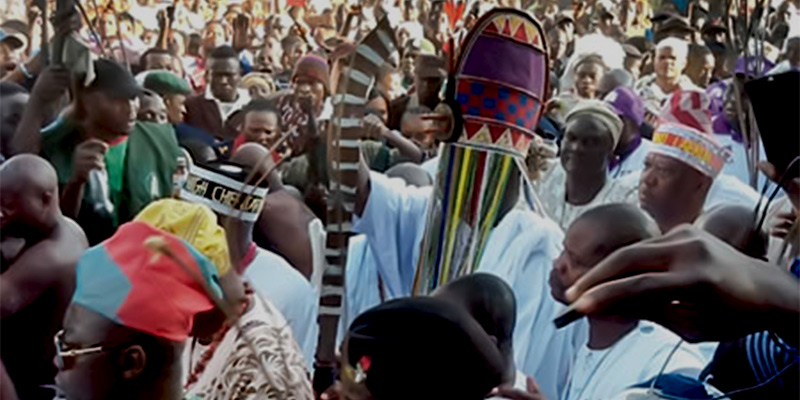Our Blogs
- Home
- How Is Olojo Festival Celebrated In Ife, Osun State-Nigeria?

- Admin
- Comment 03
How Is Olojo Festival Celebrated In Ife, Osun State-Nigeria?
Yoruba represents the ethnic group of people living in southwestern Nigeria. Yorubas follow a very strong spiritual culture, and their beliefs are exhibited through their festivals. Their festivals are quite popular not only with them but with other cultures as well. One of their primary festivals, the Olojo festival, is another ancient, annually celebrated festival of Ile-Ife, Osun State, Southwestern Nigeria. The festival is one of the most significant age-long cultural traditions, now globally signified as the ritual of celebrating black people and uniting Yoruba people. The word Olojo means "Ojo ti Ojo de Ojo" which translates to "the day of the first dawn." The festival initially started with the ultimate purpose of celebrating God's creation and human existence. Now you know the meaning of the festival, it's time to jump into why and how Yoruba people celebrate the Olojo festival.
Olojo Festival- Cultural Heritage Of Yorubas
Olojo is one of the ancient and most important Yoruba festivals celebrated worldwide with the significance of acknowledging God's creation. Yorubas celebrate the Olojo festival in a way to honor God Almighty and their culture and heritage. It is believed that the festival represents the celebration and pride of all black people worldwide. The festival originated after their Imperial Majesty, Oba Adeyeye Enitan Babatunde Ogunwusi, Ojaja II, and The Oonirisa (Ooni) of Ife. The festival also honors "Ogun," the God of iron, the first son of Oduduwa, the ancestor of the Yoruba race.
The festival is a combination of many sociocultural and traditional activities celebrated for almost a week. An Olojo festival is celebrated with a ritual known as "Gbarjuree," a cultural carnival. After this ritual, Ooni, the king of Ile Ife and the spiritual leader of the entire Yoruba population, do a fasting and denial seclusion for around seven days, also soul-speaking with their ancestors and praying for peace, unity, and prosperity in the land. This seven days' seclusion further purifies the king and increases the chances of his prayers and pleas being listened to by God and his ancestors. Besides these seven days going on, a series of traditional rites are also being performed in some strategic locations in the city.
Then there is an Aare Crown, which is essential to the Olojo festival. The Olojo festival celebrations include a tradition in which the Crown is adorned and worn by the Ooni once a year, and that too during the Olojo festival. This tradition originated from Yoruba mythology, in which the Aare Crown was handed over to Oduduwa by Olodumare during the creation of the earth. Later, after the expiration of the seven days of seclusion, the Ooni wearing a 50kg Aare Crown walks to Okemogun to offer sacrifices to Ogun, the God of iron and roams around other religious spots in the city while praying for his people.
Since the Olojo festival signifies a very intense and deep meaning to humankind and celebrates the creation of the earth, participation in the festival comes from many different age groups and genders. Therefore, unlike other festivals which restrict the entry of a particular gender or age group, the Olojo festival is a very humanly and meaningful festival celebrating the entire humankind regardless of age and gender. Moreover, it represents the unity and homecoming of the Yoruba as a whole race. Therefore, the celebration is actively open to everyone.
Conclusion:
The festival means a lot to the black race, especially the people of Ife, Osun State-Nigeria. The festival itself signifies a very meaningful purpose of celebrating humankind and the creation of the earth. The Yoruba people celebrate the Olojo festival with great enthusiasm and devotion to their king and Yoruba heritage. Many people from around the world visit Ile Ife to enjoy the richness of their culture and this inspiring festival. The people who attend the Olojo festival are very fond of the native drum sounds and the melodic voices of the native people of Ile-Ife. They enjoy dancing, singing, and bowing with sincere adoration towards the king and greet each other with love throughout the festival. The festival also celebrates the unity of humankind and the unification that binds together the entire black race.
Reference:
Theguardian, C.H.U.K.S. .N.W.A.N.N.E. (2018, 17 November). Olojo Festival … Grand celebration of rich Yoruba cultural heritage. [Weblog]. Retrieved 5 January 2023, from https://guardian.ng/features/olojo-festival-grand-celebration-of-rich-yoruba-cultural-heritage/
